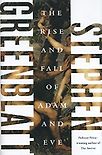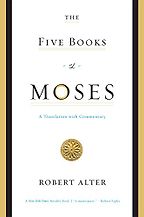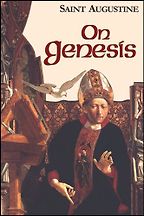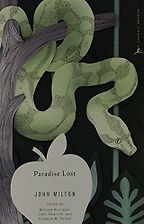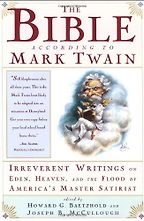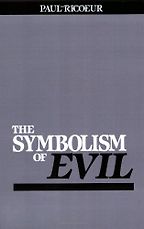Who were Adam and Eve? And where does their story come from?
We don’t know. We know it comes from somewhere in the near East, but its origins are earlier than any records we have. Adam and Eve show up, of course, at the beginning of the book of Genesis but it’s widely thought that the story was circulating, possibly in writing and certainly orally, well before then. The naked man and women, the talking snake and the magical trees weren’t invented at the moment the book of Genesis was written down. Someone—woman, man, or group—came up with this tale maybe 1000 years BCE, maybe more. What we do know for sure is that other cultures in that part of the world, and everywhere else, have ideas of where we came from.
What about the Babylonian connection?
I believe that there is a relationship between the Adam and Eve story told in Genesis and a variety of origin stories told by the Sumerians, and later by the Babylonians. Genesis is a reaction against those earlier stories—for example, a far stronger emphasis on human responsibility for our miseries—but also an appropriation of certain elements.
Is it pretty certain that Genesis was written down in the 5th century BCE?
Here too nothing is certain. The Five Books of Moses and indeed the Bible as a whole doesn’t survive in manuscript form until centuries after the 5th century BCE – copies of lost copies of lost copies. This is above my pay grade, but the prevailing theory is that Genesis was probably redacted and written down shortly after Cyrus triumphed and the Hebrews who wanted to were allowed to go back to Israel and Judah.
Why has the Adam and Eve story has persisted in three major religions—Christianity, Judaism and Islam?
The world is full of origin stories. It’s surprising that this one has turned out to be the origin story for three major world religions. The three religions of course have an historical relation to one another—that’s why they have a shared origin story—but it still means a lot of people over a very long period of time signed on to this very strange narrative.
“We’re related; we’re all cousins, we’re not from different hominid lines”
The narrative is, in its way, clever in suggesting that we are the descendants of a single male and a single female. Scientists now think it wasn’t a couple; the man and woman from whom we all descend might have lived thousands of years apart. Still, it’s monogenesis, as the evolutionary biologists call it, and not polygenesis. That turns out to have huge implications. We’re related; we’re all cousins, we’re not from different hominid lines.
That’s interesting, because you’ve called The Rise and Fall of Adam and Eve your most personal book so far.
Well, it’s about my ancestors—my relatives.
It’s personal for all of us, then?
Exactly. The story asks you to imagine what your primordial parents were like, to see them in their original state, to see them naked. In the case of Augustine, to think about how they made love. That’s one of the reasons that I include that marvelous Rembrandt etching in my book. It’s a particularly astonishing image, at once poignant and funny. It’s like seeing your parents, but really all too much like seeing your parents.
In Britain we pay a lot of attention to our classical heritage and, for example, the story of Noah’s Ark appears in Greek mythology. But Greek mythology also has stories about where we came from, and these haven’t survived as well as the story of Adam and Eve.
The Greek origin myth that has most notably survived, I suppose, is the story of Pandora. Most of us know it, especially its bitterly misogynistic core. It’s not part of the Hebrew account, but was somehow folded into its interpretation by Christians who knew the Greek stories.
We don’t know all that much about early reception, but if the Bereshit Rabba is any indication, the story of Adam and Eve wasn’t principally used by the rabbis to blame women. There was plenty of misogyny in their world, but it was not justified by Genesis. The same holds true for the Muslims who do not hold the woman principally responsible for our woes.
The first book you’ve chosen to discuss is Genesis, as it appears in Robert Alter’s translation of the Five Books of Moses – the first five books of the Bible. Here the story of Adam and Eve is actually very short, isn’t it?
The story as we have it is told in chapters 1-3 of Genesis in very few lines, 50 verses or so. It’s next to nothing, and yet it is unforgettable. I chose the Robert Alter translation because it’s extremely sensitive to the Hebrew original. You can find online a word-by-word translation of the Hebrew original, but that has no poetic power. Robert Alter has a profound literary sensibility and he’s highly alert to the implications of the Biblical Hebrew.
To take a single example, in the King James version of the Bible, it says that Eve was hungry and saw the tree was ‘pleasant’ to look at. The translators deliberately chose a rather neutral word. Alter points out in the notes that the Hebrew word is actually ‘ta’awah,’ which means ‘lust for the eyes.’ You wouldn’t know, if you didn’t read Hebrew, that the tree is described as an object that arouses intense desire.
“You wouldn’t know, if you didn’t read Hebrew, that the tree is described as an object that arouses intense desire”
Why is it so interesting that God creates a particularly alluring tree? The United States is filling the world with potentially disastrous nuclear waste. We naturally desire to put this waste somewhere where people can’t get their hands on it and destroy themselves. We bury it deep underground, and we worry about the signs we put up to guard it, because we take in that someone coming upon the sign in 10,000 years may not understand our words and images.
Genesis too is a story about an evil that will poison the entire human race; indeed God knows that it will poison the entire human race. He says to Adam—not to Eve, but to Adam—‘Do not eat this, lest you die.’ He does not explain to the human what death is. He puts the tree in the middle of the garden. He doesn’t build a fence around it. And the tree produces fruit that is ‘lust for the eyes.’ That’s a turn of the screw, and one that people for several thousand years have brooded about. Ta-awah focuses the story on the relationship between freedom and desire and raises questions about the responsibility of god as well as humans.
So much is written into the story at a later date. There’s no mention of sin, a ‘fall,’ Satan, or even an apple. A lot of the things we associate with the story aren’t there. Why is that?
It’s quite important that they’re not there. No motivation is given to the serpent; there’s no account of original sin. It’s unclear from the verses whether mortality—either for humans or all creatures—is an actual consequence of this act, or that it was part of a natural fate that eating the fruit of the tree of life might have averted, had the humans not been expelled. Many questions are left open.
The story cunningly, brilliantly represents the fatal transgression as the eating of a piece of fruit. Not the digging of a tuber, not the killing of an animal, not the planting of wheat. We still represent, in fact we still experience the plucking and eating of fruit as one of the fundamental human pleasures. I’ve never killed a chicken in my life, but I’ve eaten a lot of apples off trees. The eating of fruit is human survival in its perfect form, in the Bible’s own account and in our lives, and yet that is the act that causes the disaster.
Is it true that in the Quran the snake is a camel?
At least according to al-Kisa’I’s early 13th-century Tales of the Prophets, yes. It’s a particularly beautiful, alluring camel. In the Quran, the serpent is identified as Iblis, the Satanic tempter who stood up and resisted Allah out of pride and arrogance.
What do we make of the fact that Adam becomes 930 years old?
It’s a nice, long life, but it’s not a round number like one thousand. At least in one account, he gave seventy to King David. But there’s a dauntingly long record of commentary and speculation.
Let’s move on to your second choice, a translation of On Genesis by Edmund Hill in The Works of Augustine. What did St. Augustine say about Genesis, and why did his account make your list?
There are relatively few figures who make a huge intervening difference in the transmission and reception of the story, and Augustine is one of these in a crucial way. The reason I chose this particular edition is that it brings together Augustine’s mature and profoundly influential attempt to read the story in a literal way with his earlier, relatively Manichean account, which allegorises the most disturbing elements. Augustine went back to the Adam and Eve story over the course of his lifetime and changed his views. The book follows his development through to the moment he repudiated the allegorical interpretation and embraced the literal interpretation.
Get the weekly Five Books newsletter
As so often in the history of religion, what appears to us to be a cruder and coarser account trumped what looks like a more sophisticated account. Allegory allows you to avoid all kinds of problems with it, whereas a literal reading of the story is an unbelievable headache. Augustine, who knew the allegorical tradition inside and out, made the decision to bequeath to western Christianity an insistence on the literal truth.
Why does the Adam and Eve story have to become literal truth for Augustine?
In my book, I speculate that a key factor was Augustine’s experience of his own body, and I focus on the scene in the Confessions in which, as a sixteen-year-old with his father in the bathhouse in Thagaste, he has an erection. But I don’t suggest that’s the only factor.
“Augustine concluded that if you think that Adam is an allegorical figure, eventually you’ll wind up thinking that Jesus is an allegorical figure, too”
From a theological point of view, Augustine thought that if you believe that Adam is an allegorical figure and not real, eventually you’ll wind up believing that Jesus is an allegorical figure, too. Paul said, after all, that Jesus is the new Adam. Augustine felt this was a slippery slope toward the allegorising of everything: that the bread would be allegorical and not the body of Christ; that salvation, redemption and the afterlife would be allegorical.
It’s almost as if the survival of Christianity depended upon the literalisation of this particular tale.
Did it actually? Probably not. But Augustine seemed to think so. In the long tradition, there were plenty of Christians and Jews who resisted literalisation. But Augustine is the single most important theologian in the entire Christian tradition and he decided, ‘Yes, this is where I’m going to plant my stake—on taking this story literally.’
“Determining what counts as a metaphor is a huge psychological, anthropological and moral challenge”
He took 15 years trying to write his literal interpretation, and he couldn’t finish it. The trouble is, you can’t actually interpret the Book of Genesis literally, any more than you can when Jesus says, ‘I am the door; I am the vine.’ Is he a door? Is he a vine? Of course not. It’s a metaphor.
There are plenty of moments in the story of Adam and Eve when you bump your head against what seems to be a metaphor. To take a single example: “their eyes were opened and they were ashamed”—after they’ve eaten the fruit. There were people who asked, ‘Hey, does that mean they were blind before? And stumbling around, and just happened not even to know what tree they were picking from?’ No! They had to have been sighted.’ So, ‘Opened their eyes’ must not mean that they literally opened their eyes; it must be a metaphor.
But the challenge of determining what counts as a metaphor and what doesn’t—essentially a literary critical challenge—turns out to be a huge psychological, anthropological and moral challenge, too.
Other than literalisation does Augustine add anything else to the story? Doesn’t he add original sin?
He certainly does add original sin. That turns out to be his poisoned apple, so to speak, though of course it was a brilliant one. From our perspective—living in Oxford or the Upper East Side or in Cambridge, Massachusetts—many of us think that the British-born Pelagius had the right idea. Infants are not born wicked. We don’t inherit some kind of evil from something that was done by our remotest ancestors. Sin is not a sexually transmitted disease—all of which seemed to be Augustine’s positions.
But Augustine effectively knocked Pelagius out by saying, ‘Look around. It can’t be that human beings behave this way just because they follow bad examples or make mistakes. There must be something fundamentally, doctrinally wrong with us from the beginning as creatures, in the way we have been made and reproduced.’ It’s a little hard looking around, at least at the present moment in my country, not to conclude that he was right. There’s something seriously wrong with us as a species.
I find the story weird in that what they pick up from eating from the tree of knowledge is awareness of their nakedness. Why should that be?
It’s fascinating, isn’t it? By a rich tradition of interpretation, Adam and Eve saw themselves for the first time not simply as vulnerable and without clothing, but as sexual beings—hence, nakedness refers to genitals. In Augustine’s account, nakedness particularly shows what it means to be aroused if you’re a male. It’s visible, and you’re not in control of it.
Augustine is obsessed with thinking that being aroused is bad, but that’s not in the Adam and Eve story, is it?
What’s in the story? Nothing and everything. In some sense, the story gives you so little, but by giving you so little, it invites you to wonder. That’s part of its brilliance.
Let’s talk about your third choice, Milton’s Paradise Lost. Why is this poem so vital to the history of the Adam and Eve story?
Milton is a profound inheritor of Augustine and the whole Christian theological tradition. But, at the same time, he’s ferociously independent and determined to think through everything for himself. He won’t simply take anything on faith, embracing it without thinking it through. To question and decide for himself is essential to Milton’s whole sense of what it means to be a free human being.
“Milton gives a brilliant and painful description that anyone who has been in a relationship for more than five minutes will understand”
In his astonishing intervention in the Adam and Eve story, Milton considers how it was possible not for ignorant children, but for knowing, thoughtful, complex human beings to do what they did. Specifically, he asks, why was the woman alone when she had her fateful conversation with the serpent, and why did she then do what she did? It’s characteristic of Milton that he works out in the most exquisite and excruciating detail the conversation between the man and the woman when they decided briefly to separate. It wasn’t at all accidental that they were apart; it was a choice that Eve made after her conversation with Adam. And so too it wasn’t mere hunger that led her to eat the fruit.
Milton gives a brilliant and painful description that anyone who has been in a relationship for more than five minutes will understand, a description of trying to negotiate your separateness from someone you love and to whom you are committed.
There are so many varying critical interpretations of how Eve emerges as a figure in this poem. For one thing, she is always at a secondary remove from divinity.
Yes. She’s told that constantly by Raphael, by Adam. Everyone agrees. She agrees, too, and she’s trying to figure out what to do as a result. Milton depicts her as deeply thoughtful.
Yes! There’s that wonderful moment where she narrates coming into being, how she felt when she discovered she was alive:
“That day I oft remember, when from sleep / I first awaked, and found myself reposed / Under a shade on flowers, much wondering where / And what I was, whence thither brought, and how.” [IV.449–52]
Given where Milton and his whole culture was coming from, I’m in awe of what he did with her. We can and should grasp the misogyny that shapes this theological vision. Milton buys into it, of course, but he burrows so deeply into these materials that he comes out the other side. Not in a brief for feminism, but in a deep embrace and celebration of Eve’s decision, in the face of the prohibition and the subordination, to be free. I think Milton’s poem is an extraordinary celebration of Eve—the most powerful one that was ever written.
At one point, Eve even paraphrases a bit of Genesis:
“His flesh, his bone; to give thee being I lent / Out of my side to thee, nearest my heart, / Substantial life, to have thee by my side / Henceforth an individual solace dear” [IV.483–86].
How does the Bible fit into Milton’s theological vision? What he ultimately seems to be saying is that though the Fall is inescapable and irreversible, Adam fell with Eve not just into sin, but into love. And he fell because he was consubstantial with Eve, ‘flesh of my flesh.’
Two points to pick up from what you’ve just said. One is that when Eve proposes to go off by herself, and when Adam objects, saying, ‘No, we have an enemy out there, we should stay together,’ Eve perfectly reasonably wonders, ‘What does he mean, we have an enemy out there? Does he think we have to cling constantly to each other?’ After all, she reflects, they’re in paradise, and they’re planning to live there forever. She quips, ‘Well, if that’s the case, I might as well have just stayed a rib in your side!’ It’s the humans’ first joke.
“He wants this particular woman, the woman who is part of his very being”
The second point is what is meant by consubstantiality. In a very clear-sighted way, Adam grasps that God could take another rib and make another rib for him. But he doesn’t want that; he wants this particular woman, the woman who is part of his very being.
In your book, you show how that’s a biographical reflection upon Milton—we see through this part of the story Milton falling in and out of love.
Each of the books we’ve been discussing are intensely biographical and personal. All great interventions in the Adam and Eve story are only great because people bring themselves 100% to the table, and don’t leave anything behind. Milton, Augustine or any of these figures—they’re completely there, body and soul.
I wonder if we might juxtapose that with the vision of Adam and Eve offered by Mark Twain, your fourth book choice.
Mark Twain is no Augustine or Milton, but he’s wonderfully wry and funny and touching. His imaginary diaries give you access to the whole Enlightenment push against the biblical origin story.
One of the themes in my book is that under the impulse of Augustine, the characters of Adam and Eve are made more and more real. As in the story of Pinocchio, the strings are eventually cut, and the figures, ceasing to be mere puppets, seem to be actual agents in the world. This is another way of saying they become more like great characters in fiction—Hamlet, or Dorothea Brooke, or Isabel Archer.
“Under the impulse of Augustine, the characters of Adam and Eve are made more and more real.”
In both ‘Eve’s Diary’ and ‘Adam’s Diary,’ Mark Twain is playing, very delicately and beautifully I think, with that development into fiction. He imagines what the consequences are of treating them as real, and he is trying to provoke both an ironic laughter at these characters and also anger at the kind of God that would expose them to terrible danger without trying to protect them.
There’s a real irreverence there, but in your book, you seem quick to say that Twain’s purpose is “less to ridicule the Bible than to explore with considerable tenderness and delicacy the comedy of sexual relations.”
Samuel Clemens was perfectly capable of ridiculing the Bible. My point is that he isn’t Voltaire. Mark Twain’s is a different kind of project, more playful, funnier, and more poignant.
At the turn of the century, do we see a decreasing reverence for the Adam and Eve story—an increased propensity to treat it with humour?
Not in my country! Notwithstanding the endless New Yorker cartoons, a large segment of the population of the United States has an astonishing reverence for the story of Adam and Eve and has embraced the Augustinian literalism. In truth, the story is very hard to get rid of, and I’m not sure that getting rid of it would be a great triumph. Not until we come up with a more convincing account of human responsibility.
“It’s confusing and confounding, but the way Kafka stories are confusing and confounding”
The story is a myth about taking responsibility for what happens to you. In some ways, that’s a monstrous idea. You think of little children getting cancer, and you wonder, ‘Did Augustine really think this is because they are sinful as a consequence of the sin of Adam and Eve?’ (The answer is yes, that is really what he thought.)
Nonetheless, the story explores deep questions that our contemporary scientific culture has not by any means addressed adequately. The ancient story remains good to think with: it’s confusing and confounding, but the way Kafka stories are confusing and confounding.
Turning briefly to your last book, I have to admit I found The Symbolism of Evil a bit impenetrable.
Ricoeur’s book is brilliant at teasing out what it means to have taken on this particular myth, as opposed to—going full circle to where we started—the Babylonian myths. Those myths do not explain suffering and death as the consequence of human responsibility and sin. They center instead on the simple fact that human beings are incredibly noisy. Infants in particular make an appalling racket. That’s what the senior god is furious about. Unable to take his afternoon nap, the god reduces the population by introducing death—particularly death in childbirth and infant mortality—to keep the population down.
The Bible offers an alternative account, one that involves love and pair bonding. And then in the Bible, a human choice, a deliberate act, brings down the catastrophe.
To Ricoeur, freedom is the origin of evil. How does he get there from the initial argument that the story of Adam symbolically condenses the plight of the Hebrews?
Ricoeur is not saying that freedom is evil. He’s saying you cannot have a conception of responsibility without developing a conception of evil. As opposed, let’s say, to the myth of Philoctetes from Sophocles, where the disaster comes simply from inadvertently wandering into a sacred precinct you’re not supposed to be. Ricoeur teases out the tiny piece of intentionality that needs to be there for the whole tangled philosophical history of evil and responsibility to be developed. You have to make a choice—Eve’s choice.
Five Books aims to keep its book recommendations and interviews up to date. If you are the interviewee and would like to update your choice of books (or even just what you say about them) please email us at [email protected]
Five Books interviews are expensive to produce. If you've enjoyed this interview, please support us by donating a small amount.

